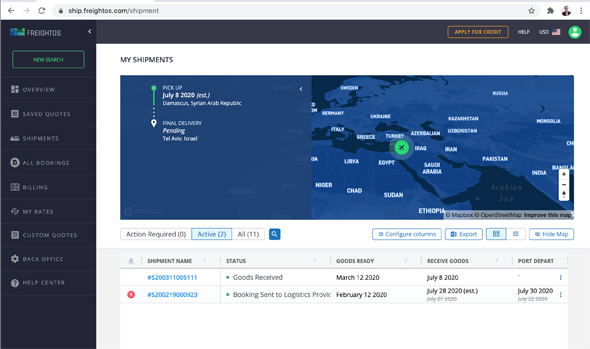

Spotlight
Simplified Shipping: Freightos' digital booking platform is innovating the freight industry
Founded a decade ago out of the need to simplify the complicated, old fashioned world of international shipping, Israel's Freightos aims to become the Booking.com of freight
Product: Global freight booking platform
Raised: $118.3 million
Round: C
Founded: 2012
Founder: Zvi Schreiber
British-Israeli serial entrepreneur Zvi Schreiber never gave too much thought to the ins and outs of international import-export shipping until he became CEO of the Lod-based clean tech electronics company Lightech in 2011, which he subsequently sold to GE Lighting later that year.
"At Lightech we were shipping every day," Schreiber told CTech in an interview, "and as someone who suddenly found himself dealing daily in import-export, I shockingly discovered that the entire freight shipping world was extremely outdated. I assumed that if you wanted to ship a container from Shanghai to Los Angeles it would be similar to booking a passenger flight, where you go to a website, see your options, get your best price, and simply click and book it. That's how it works in retail, but not so in the world of international air and ocean shipping. Sometimes you can wait days just for a price quote and then often the invoice would not match the quote. I found the whole system to be very opaque. It was a manual process consisting of phone calls and emails, excel sheets, etc., and not at all user-friendly for a customer like me dealing in shipping.”
Schreiber said this led him to identify a huge opportunity. International shipping should go through the same digital revolution that passenger travel and retail went through. So right after I sold Lightec, I decided that I was going to create a global digital freight booking platform that would serve as a Booking.com or Priceline for international air and ocean freight, but for the shipment of goods."
In 2012 Schreiber founded Freightos. The company's name is a combination of the words: "Freight" and OS" (Operating System). Headquartered in Jerusalem with teams all over the world, including Barcelona, Ramallah and the Far East, the company has steadily grown from a handful of people a decade ago to a team of over 300 employees worldwide today. While the gradual growth of Freightos has been organic, it has also been bolstered through some major acquisitions, including Spain's WebCargo, a booking platform for freight forwarders, airlines and ocean liners, acquired in 2016, and rate management company 7LFreight, acquired by Freightos just last month. Schreiber explains that both of the aforementioned acquisitions are software companies who are strong in the air cargo trade and provide Freightos with rates from many airlines for air cargo.
Revolutionizing a complex industry
"It's a complex industry, air and ocean shipping," Schreiber says, "but one that has not evolved as much compared to e-commerce. There was a big change in the 1960's when container sizes were standardized, but since then very little has changed. I believe that our digitalization is one of the biggest changes in the industry since then, Freightos can revolutionize the shipping industry. Consider this, for passenger marketplaces there are dozens of platforms, but not so for shipping."
According to Schreiber, there are some hundred thousand freight forwarders in the world who do the actual shipping. "The problem is, you often still need to phone them up and get a price quote and wait for an answer for a couple of days - and then the price quote is not binding and you get charged more, so it's quite a mess. But at Freightos we are already starting to have an impact in modernizing the process. What's great about the Freightos platform is that any industry that is involved in physical import-export can use it. We don't particularly care what's in the container, whether it's furniture or medicines or all sorts of things. We are a platform for automating the pricing and the booking of freight, we don't handle the actual shipping ourselves. We don't employ drivers or movers or anything like that."
Price and Predictability
Total cost is important, but Schreiber says it's not the only factor. "With Freightos, it's not just about knowing your options and pricing and shipping items from Point A to Point B quickly and efficiently, but also doing so predictably. If the shipping company tells you it will take 30 days to arrive, then you know it will indeed take 30 days and not more. If they tell you it will cost $2000 to ship a container, it will cost just that and there won't be any hidden fees, no surprises.
Schreiber explains why shipping of freight is much more complicated than booking a flight for yourself. "When you book a flight on Booking.com or Kayak or any other website, you yourself walk onto the plane and go through customs, but cargo doesn't do that. Someone actually needs to do that for you: get the container on the truck, make sure it gets on the flight and then off the flight and through customs, etc. So it's inherently a more complicated industry which is why it's taken longer to digitize it and why it's taken us ten years to get to where we are now. It’s indeed a great challenge, but the time is ripe for such a change.”
Related articles
Looking ahead
As far as what's next for Freightos , Schreiber says, "The number 1 thing is more of the same, adding more importers and exporters and airlines and expanding our reach. Although we have accomplished a lot, I feel that after 10 years we're just getting started. It's a huge and complex industry and there's so much to do, so we're not close to being finished. There are so many forms of shipping: air, ocean , rail and truck. There's a lot to do but the exciting thing is that there is a lot of momentum.
“In fact, in two weeks we will launch a new initiative. For the first time ever, we and our partners will start trading futures for the price of ocean container shipping on CME, The Chicago Mercantile Exchange, the world's biggest derivatives exchange . This is where logistics technology meets financial technology as one will finally be able to trade the futures of the value of a shipping container, something which has not existed in our industry until now.
Equal access to affordable and reliable shipping
When asked about being based in Israel, Schreiber answered in a global context. "Being in Israel we are privileged that there is a lot of venture capital here, which is indeed very helpful. But beyond that, in Israel and America 90% of the products that we buy are imported, so we are very dependent on the freight industry. One of the largest container shipping companies in Israel is Zim and El Al also does cargo, so Israel is a player too.
“When I speak at conferences I often say that if I asked everyone to remove every article of clothing that was made abroad we would all be naked.,” added Schreiber. “All our electronics and all our clothing, our mobile phone, you name it, are imported, so in the end when the import-export shipping industry is working inefficiently we are all affected, every time you buy a product, so that's what we are trying to revolutionize and provide equal access to affordable and predictable shipping."

